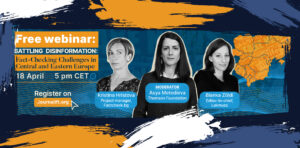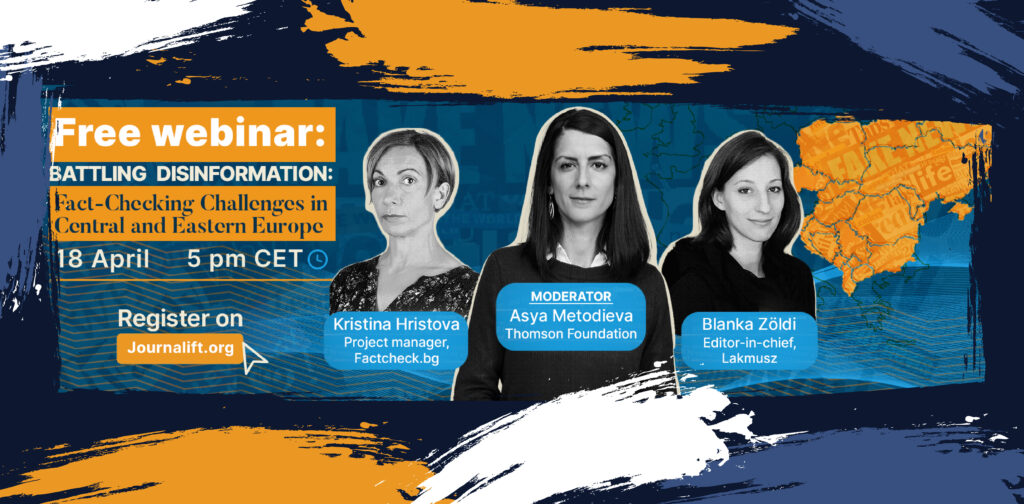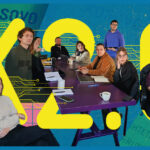After careful consideration and thorough discussions, we are happy to announce that the evaluation process in all 7 countries (Albania, BIH, Kosovo, North Macedonia, Montenegro, Serbia and Türkiye) for the EU Investigative Journalism Awards 2023 is over. Now it is time to announce the Evaluation Jury that assessed the submitted applications.
The Jury, composed of distinguished experts in journalism and investigative reporting, has diligently reviewed and assessed the submissions against stringent criteria, considering factors such as relevance, research and presentation quality, objectivity and ethics, originality and innovation, as well as impact and effectiveness.
ALBANIA
- Jeton Mehmeti is a media professional, consultant and research expert from Kosovo. Author of several reports and studies pertaining to media sustainability, disinformation and hate speech, he has worked with numerous media organisations in Kosovo and the Western Balkans region. He is currently the chairman of the Independent Media Commission and also a lecturer of communication at the University of Prishtina.
- Ornela Liperi is the editor-in-chief of Monitor magazine, the only weekly economic magazine in Albania, since 2002. She graduated in economics (MBA) and has a long experience in economic and data journalism.
- Valbona Sulçe is a journalist and media researcher, with extensive experience in diversity, gender equality, media literacy, and ethics in the media. She has written and co-written several manuals on Reporting diversity, Gender sensitivity and Reporting Trafficking of Women and Girls. Additionally, Valbona is an active member of AWA, the Albanian Woman in Audiovisual organisation.
BOSNIA AND HERZEGOVINA
- Lamija Aleckovic is a media expert with over 20 years of experience, currently serves as a Digital Journalism Advisor for BMAP Forward program in the Western Balkans. Her career includes roles as a journalist and news editor at HRT (Croatian Radiotelevision), Executive Producer at Al Jazeera Balkans, and Director of News Media Service at HRT. She also gained experience in Silicon Valley and has been involved in projects to strengthen media in the Western Balkans.
- Lejla Turčilo, is a professor at the University of Sarajevo, teaches a range of courses at the undergraduate, master's, and doctoral levels, covering topics such as media theory, journalism, PR, media and politics, and online media. With numerous authored and co-authored books, research publications, and international scientific and professional papers to her name, Dr. Turčilo's expertise spans online communication, intercultural communication, media literacy, and media freedom.
- Tanja Topić, is a journalist and scholar with a diverse background in journalism and communication. With an academic foundation from the Faculty of Political Sciences at Belgrade University, she has contributed significantly to the field with her extensive work experience, including roles with magazines, radio, and international organisations. Her expertise spans media, intercultural communication, and political discussions.
KOSOVO
- Agon Maliqi is a political analyst and media writer, was the co-founder and until recently the Chairman of the Board of Sbunker – an analytical media platform and think/tank based in Prishtina which focuses on democracy, human rights and security issues in the Western Balkans. Agon currently works as an independent analyst and consultant on these issues in the Balkans and South Caucasus.
- Arbana Xharra is an investigative journalist and an expert on religious radicalisation, author of a series of investigative reports on religious extremists and Turkey’s Islamic agenda operating in the Balkans and the European Union. Her articles were published in numerous world media outlets and prominent journals. Xharra won numerous awards for her reporting and was a 2015 recipient of the International Women of Courage Award from the U.S. State Department.
- Lutfi Dervishi is the founder, trainer and editor of the Journalism Investigative Lab at the Albanian Center for Quality Journalism (ACQJ). With more than 30 years of dedication to the field of media, Lutfi has contributed to the world of investigative journalism. Through his role as a journalist trainer, he has aimed to inspire the next generation of passionate reporters.
NORTH MACEDONIA
- Filip Rudić is a journalist based in Belgrade. With the Centre for Investigative Journalism of Serbia he won the Anthony Lewis Prize for Exceptional Rule of Law Journalism and was a finalist for the Global Shining Light Award. He is currently working for the regional TV channel N1 in Serbia.
- Boris Georgievski is a Macedonian- German journalist currently serving as the Head of the Macedonian Program with the German international broadcaster Deutsche Welle (DW). Worked as a reporter, editor and correspondent for various news outlets including Alsat-M and Balkan Insight in North Macedonia, WDR in Germany and others. Winner of the Investigative journalism award in 2008 and the EU Investigative journalism award in 2016.
- Konstantin Testorides is a journalist with more than 40 years of experience based in Skopje. He started his career as correspondent for Tanjug News Agency, continuing to work for various news outlets as journalist and editor in TV stations and news agencies. He has been correspondent for the international press agency Associated Press since 1992.
MONTENEGRO
- Boro Kontić is a journalist and the Director of the Media Center in Sarajevo. He is the author of several documentaries and the editor of more than 30 books in the field of journalism. Throughout his 40-year-long career, he has won several international awards for radio and TV documentaries.
- Nataša Ružić is an academic and journalist. She graduated in Journalism from Moscow’s “Družba narodov '' University with honours. Nataša defended her master's thesis on Balkan crisis resolution and received a University Council diploma for her research. She worked as a journalist at Radio Golos Rossii and as editor-in-chief of the youth paper Zerkalo. With a PhD in Political Science she became an associate professor, specialising in journalism and media-related subjects.
- Tena Perišin is a journalist and a professor of television and multimedia journalism, with more than 35 years of media experience. Her focus is on content production for TV and online media, news reporting skills, TV documentary production, multimedia and digital storytelling, mobile journalism, and implementation of constructive and solutions journalism in the newsroom culture.
SERBIA
- Saša Leković is an investigative journalist and the President of NGO Investigative Journalism Center, based in Croatia. As a reporter and editor, as well as a licensed investigative reporting trainer and lecturer, he has worked with a few hundred journalists all over the world. He is also one of the founders of the Global Investigative Journalism Network.
- Snježana Milivojević is a professor of public opinion and media studies. She chaired doctoral and master's programs at Bayan College in Oman and the University of Belgrade. Snježana has also participated in many international research projects concerning digital transformation of society, media and journalism with main academic interests in political communication, media policy, cultural and gender studies, and media and public memory.
- Tamara Skrozza is a journalist that has worked for radio, press and TV productions and engaged with a number of different media outlets. She covers a wide range of topics, but is primarily focused on freedom of media, media ethics, Serbian politics and gender/minority issues. Additionally, she is a columnist of Cenzolovka web portal, media trainer and an active member of Press Council.
TÜRKIYE
- Göksel Bozkurt, has a rich career history, during which he worked as a reporter, news director, and columnist. Notably, he held the position of President of the Parliament Journalists Association for an impressive six terms between 2008 and 2021. Presently, he continues to serve as the Executive Editor of ANKA News Agency and remains an active member of both the Parliament Journalists Association and the Honorary Board of the Contemporary Journalists Association.
- İsmail Bezgin, worked as a reporter and manager in the parliamentary office of AA until 1992. He continued his duties as a News-Broadcasting Manager and Deputy General Manager until his retirement. Afterwards, he took part in the establishment of the Sabah group's Central News Agency for 2 years. He is a member of the Parliamentary Correspondents' Association and Association of Journalists.
- Mehmet Vecdi Seviğ was initially a finance expert in the Ministry of Finance Inspection Board and later transitioned into journalism. His journalism career included roles at various publications such as Yankı magazine, ANKA Agency, Dünya Newspaper, Cumhuriyet Newspaper, and Başkent TV, where he covered economics extensively. He is also a founding member of the Economy Reporters Association and continues to impart his knowledge through lectures and writings on topics ranging from the history of economic press to civil society organisations.
The national ceremonies will be held in September and October 2023 in each of the project countries. The award fund in each of the countries is 10,000 euros - 5,000 euros for the best story, 3,000 for the 2nd prize and 2,000 for the 3rd. The prize amounts are cumulative, so in case two applicants share ranks, they will equally divide the prize allocated for that position.
To be the first to find out information about the winning stories, follow our website and social media channels. The award ceremonies will be held on the following dates:
- Kosovo: 20 September
- Albania: 21 September
- Montenegro: 25 September
- North Macedonia: 28 September
- Serbia: 28 September
- Bosnia and Herzegovina: 5 October
- Türkiye: 16 October
The EU Award for Investigative Journalism 2023 is part of the project “Strengthening Quality Journalism in Western Balkans and Türkiye II”.
This aims to recognise and promote outstanding achievements in investigative journalism, as well as improve the visibility of quality journalism in the Western Balkans and Türkiye.
The project is funded by the European Union, and it is implemented by a consortium composed of Balkan Investigative Reporting Network – BIRN Hub, Central European University (CEU) – Hungary, Association of Journalists (AJ) – Türkiye, Thomson Media (TM) – Germany, University Goce Delcev Stip (UGD) – North Macedonia, The Independent Union of Journalists and Media Workers (SSNM) – North Macedonia, Media Association of South-East Europe (MASE) – Montenegro and Balkan Investigative Reporting Network Kosovo (BIRN Kosovo).































